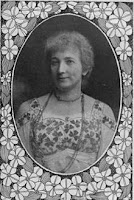Today we celebrate the birthday of the little-known composer Alice Nevin, born in 1837 in Pittsburgh. Her father, John Williamson Nevin, was a theologian in the German Reformed Church and taught at various seminaries before becoming the president of Franklin & Marshall College in Lancaster, Pennsylvania in 1866. It was in Lancaster that Alice lived for most of her adult life, and where she is still remembered today.
As with many other women hymn tune composers, only scraps of information can be gathered from various sources. For example, a house that she lived in after 1903 is today part of a walking tour of historic homes in Lancaster. By that time she was quite well-known there, having founded the Iris Club in 1895. She invited seventy women to her home and proposed the formation of a women's club (to be named for the the Greek goddess of the rainbow) which would "further the education of women and encourage movements for the betterment of society, and foster a generous spirit in the community." The Iris Club founded the first free kindergarten in Lancaster and also a well baby clinic in its early years. It remains in existence today, and its facilities (a historic house bought by the club in 1898) can apparently be rented for special events. Another Lancaster history site adds that Nevin was active in the cause of women's suffrage.
For several years Nevin was the organist at the First Reformed Church. While there, she edited a hymnbook which was published by the Philadelphia firm of J.B. Lippincott, Hymns and Carols for Church and Sunday School (1879). Unfortunately it is not yet available online, but it was well-reviewed in its day. From the Reformed Quarterly Review:
The object of the author was to provide something above the light, jingling tunes that have run Sunday-school singing into a sort of secular jollification, and that are fast becoming a nuisance. (...) It is music that will wear. Let our Sunday-schools test it by a fair trial, and we are sure it will win favor.
More succinctly, The Churchman said that the book was of "a much higher order than usual, and it deserves to become popular."
Today's tune by Nevin was published in that same year (probably in her hymnal) but it had perhaps been sung earlier in her church. It was written for The Lord of Life is risen, an Easter hymn originally in German that was translated by Henry Harbaugh, an earlier pastor of the First Reformed Church, in 1860. Since we're rather past the Easter season, I've matched it to another general text (also originally in German and translated by Catherine Winkworth). The golden morn is breaking;
I thank you, God once more,
Beneath your care awaking,
I find the night is o’er.
I thank you that you call me
To life and health anew;
I know, whate’er befalls me,
Your care will still be true.
O Israel’s Guardian, hear me,
Watch over me this day;
In all I do be near me.
For others, too, I pray;
Grant us your peace and gladness,
Give us our daily bread,
Shield us from grief and sadness,
On us your blessings shed.
You are the Vine -— oh, nourish
Your heirs on shore and sea,
And let them grow and flourish,
A fair and fruitful tree.
Your Spirit pour within us
Such boundless gifts of grace,
And life eternal win us,
That all shall sing your praise.
Johannes Mühlmann, 1618
tr. Catherine Winkworth, 1863; adapt.
Tune: RESURRECTION (7.6.7.6.D.)
Alice Nevin, 1879
Nevin's tune has also been matched with The day of resurrection, another translation by John Mason Neale, but the tune name shouldn't limit it to Easter texts alone. I think it's pretty singable. Though the Cyber Hymnal lists only this tune by Alice Nevin, I have found three others in various hymnals, and I suspect that her own hymnal might contain more.
She died in 1925, and The Lord of Life is risen was sung at her funeral, which was held in the chapel at Franklin & Marshall College. As described later, the people gathered there heard Nevin's RESURRECTION once more, "its triumphant notes ringing from the old organ which had often responded to her own fingers..."













 Mary Magdalene
Mary Magdalene